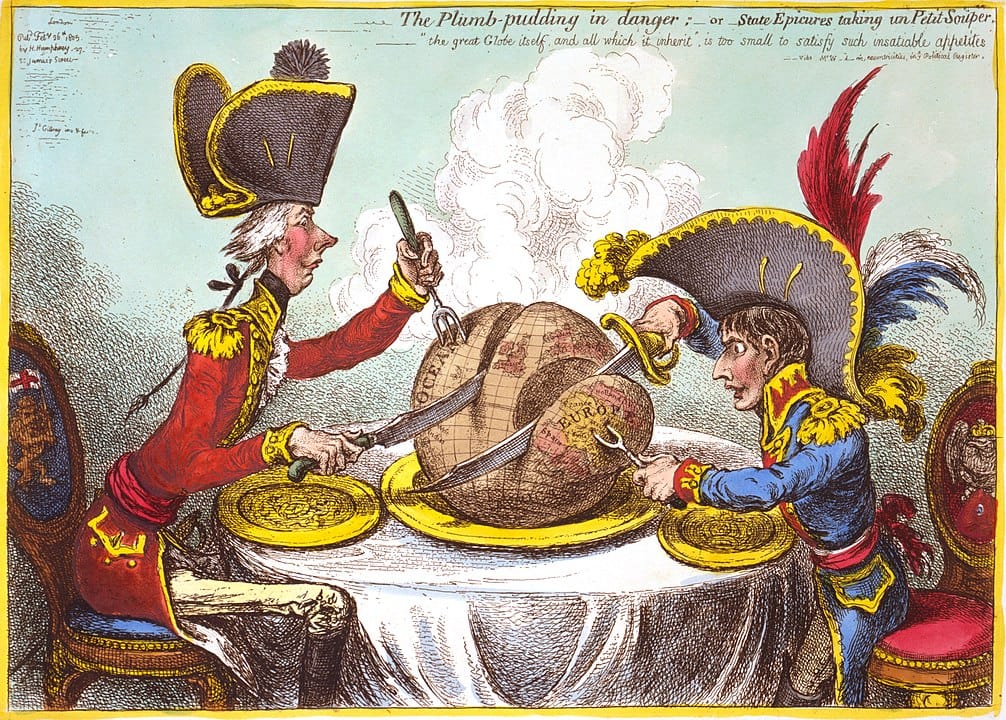The Bellicose Stance of the State
The incoming "America First" coalition is likely to put the United States in greater, not less, risk of conflict.

Both during the 2024 campaign and in the current debates regarding President-Elect Donald Trump’s appointments—particularly those in national security positions like Tulsi Gabbard and Pete Hegseth—one of the common but rather puzzling insults thrown at Democrats is that they are "warmongers." This may come as a surprise, given that Joe Biden was the president who finally ended the war in Afghanistan, while Trump famously cancelled the Iran Nuclear Deal and ordered the assassination of Iran’s most important national security figure. Of course, mudslinging, especially done by rightwing activists, doesn’t need to be accompanied by much in the way of empirical evidence, but for such a charge to stick there usually must be some intuitive reasoning behind it, even if it’s unaccompanied by evidence.
In the case of "Democrats as warmongers, Donald as dove," the key argument seems to be that Democrats are prone to starting wars because they are "globalists," never putting America first and always getting too interested in everyone else’s business. The argument in this form posits that either through idealistic do-goodery or to protect cosmopolitan economic interests, these "globalist" forces are more likely to drag the United States into foreign conflicts. This seems to make intuitive sense; indeed, the ostensible danger of overseas trade has often been used (as by Jefferson and later by Hoover) as a justification to limit that trade. However, this intuitive reality in truth isn’t accurate. In the United States and elsewhere, internal coalitions that denigrate foreign trade have often been the most bellicose. Their coalitions have the least to lose from war, and swearing off free trade makes seizing resources through force seem more attractive. This unfortunately means that the incoming "America First" coalition is likely to put the United States in greater, not less, risk of conflict.
A useful framework for understanding why can be found in the history surrounding the First World War. In an article published in International Security in 2014, one hundred years from the beginning of World War I, Etel Solingen provides a useful framework for evaluating the way countries' internal and external politics interact to create more or less bellicose states. Comparing China with Imperial Germany a hundred years earlier, Solingen argues that the primary driver of foreign policy is domestic political coalitions, which will tend towards being either more inward-looking or more internationalizing. These coalitions have both material, economic components and broader policy and ideological conceptions. Inward-looking coalitions economically desire to build up an autarkic economy that in turn favors local, static elites. This is especially attractive to those that have gained their status and wealth through local dominance of internationally non-competitive economic sectors. Because a modern economy requires a variety of resources, however, this disavowal of free trade means "inward-looking" coalitions are perhaps misnamed, as they in fact seek opportunities to gain natural resources and perhaps even markets outside the borders of the metropole, primarily through imperialism or settler colonialism.
Internationalizing coalitions, by contrast, are made up of "internationalists," those more dynamic economic and cultural elites for whom global interaction and free trade is an opportunity, not a threat. Internationally competitive industrialists may fall in this category, as also do many academics, cultural producers, and others who benefit from free international trade. Though in the United States (and earlier, the United Kingdom) such figures may see the value in a strong navy to protect sea lanes, they generally are more dovish and find both the taxes (in the 19th and early 20th century, generally tariffs) needed to run a military and the disruptions caused by warfare to be contrary to their economic and ideological interests. Cosmopolitanism tends to trump nationalism in their hierarchy of values.
An inward-looking coalition dominated Germany in the run-up to 1914 in an arrangement called the "Marriage of Iron and Rye." Starting in the 1870s, the noble, landowning Junkers demanded protectionist tariffs to protect against cheap American grain, while industrialists sought the same to keep out British manufactured goods. Solingen argues that this preponderance of inward-looking forces reduced the war aversion of the German Empire. This coalition was more prone to brinkmanship than a more internationalizing coalition would have been (such as the Democratic party in the United States, which would not enter the war until several years after its outbreak).
Solingen also notes the importance of Germany’s neighbors in contributing to the outbreak of the war, cataloging how Austria, Serbia, and Russia also were influenced by strong inward-looking coalitions, which also influenced their appetite for brinkmanship and ultimately willingness to enter into a war that devastated internationalist interests for decades to come. Solingen concluded that China of 2014 was still dominated by an internationalizing coalition, and that despite rising nationalism, reliance on foreign trade and direct investment meant it was likely to remain conflict-averse. The last ten years, however, have seen Chinese interests grow increasingly inward-looking, as the country imposes controls on key material exports and seeks greater economic self-sufficiency. Other major rivals of the United States like Russia and Iran have been forced by international sanctions to also adopt an autarkic worldview, leaving primarily "inward looking" (though imperialist) coalitions in charge of those countries as well. The ingredients for a more dangerous world, in other words, are building up at just the time the US itself has turned in a similar direction.
While the British Empire was somewhat more reluctant to join World War I, there too there were forces that believed the future of British glory lay in armed conflict and the future of British trade in its expansive empire. Leonard Hobhouse, an English liberal writing his history Liberalism on the eve of the war, described the biggest danger to liberalism at the time as an expanding ideology emphasizing “the ideal of the efficient, disciplined nation, centre and dominating force of a powerful, self-contained, militant empire.” This description, coming a decade or so before the formal rise of the fascist movement, concisely sums up the reactionary anti-liberalism that was already rising in the early twentieth century, and also perfectly describes the dominant world view of the incoming Trump administration. It is certainly the case that Mr. Trump sees it that way, obsessed as he is with identifying "bad deals" and countries "taking advantage" of the United States.
The ideal of self-contained autarky does not mean, as one might suppose, a less interventionist view on the world. Instead, eroding the norms of free trade obligates an advanced economy to have direct access to whatever resources it might need, or else a way to ensure the countries it buys from are perpetually in friendly hands. America’s own history can be something of a guide here—the same presidents (McKinley, Theodore Roosevelt, and Taft) who presided over the high tariffs of the Gilded Age also committed the United States to annexing Hawaii, the Philippines, and Puerto Rico, and creating a virtual empire out of most of Latin America. Coalitions that are generally inward-looking are not above having their eyes wander avariciously to foreign soil. Far from facilitating a peaceful transition to "America first" isolationism, a United States traveling this path is likely to be less averse to bellicosity and more willing to risk war, having weakened any internal commercial or civil society coalition that might push back against it.
And any pushback, at least from corporate America, is likely to be muted: with an "America First" federal government, firms will have strong incentive to join the inward-looking coalition if they can, much like Prussian industrialists and farmers a century ago. The major economic policy of the Trump campaign was sweeping tariffs on foreign goods. If these tariffs operate to "protect" American industries from competition, history suggests that those industries will become dependent on tariffs for their very viability, causing firms to see trade as a liability, not an opportunity. Commercial interests will be less willing to resist autocratic encroachments because their futures will be dictated largely by the whims of the Trump administration's tariff policy (as well as any economic aid doled out to industries affected by retaliatory tariffs, as agriculture was during the last Trump administration). Solingen notes that with inward-looking coalitions, "External insecurity and competition offer rationales for extracting societal resources, collecting monopoly rents, creating cartels, rewarding protectionist constituencies, and undermining internationalizing competitors." By 1914, very few interests remained in continental Europe that could forcefully stand against the road to war; internationalist coalitions had been politically beaten in most states.
Many of these trends are already notable today. For example, the specter of external insecurity was used by the first Trump administration to justify emergency tariffs on steel and other goods, and similarly the Biden administration argued for the strategic necessity of tariffs on electric vehicles and photovoltaic cells. The close connection between Elon Musk and the Trump transition team creates myriad new opportunities to undercut competitors and reward Musk’s own companies, including by the use of foreign policy. For example, Vice President-Elect J.D. Vance’s threat to pull back from NATO commitments if the European Union regulated Twitter (now called X) in ways the administration disapproved of clearly shows preference for one business over similarly positioned ones, precisely because (with Musk’s promotion of accounts opposing immigration as well as aid to Ukraine) X is a key media player in the broader inward-looking coalition. Other key players may be less flamboyant than Musk but it is safe to assume that they are similarly adjusting their strategies to better survive an inward-looking coalition, and, in so doing, strengthening the coalition itself.
Non-interventionist observers and activists may have hoped that this isolation from trade would have also meant a reduced focus on international power projection. This remains to be seen—Trump’s choices for Secretary of State, UN Ambassador, and Secretary of Defense all have a strong hawkish tendency, and while Trump has expressed some skepticism about continuing to support Ukraine in its defensive war against Russia, he has evinced no similar reservations about supporting Israel to the hilt and has even proposed using drone strikes and special forces against Mexican drug cartels. While non-interventionists may play some role in the Trump administration, support for the most bellicose ally of the US, the state of Israel, continues to appear as an uncompromising litmus test for service in the administration. This not only undercuts internationalist coalitions, by tying the United States to a state increasingly isolated from the UN and international law, but also creates myriad opportunities for military conflict. There are several ways this could occur.
For decades, experts have seen the US as a "status quo" power—while it may have intervened in other countries’ specific affairs, it was dedicated to overall preservation of the world order it had helped create during and after the Cold War. This order emphasized peace between great powers and international institutions dedicated to maintaining increasing economic links between states to give all of them a stake in trade and a growing global economy. However, these were policies pursued largely by an internationalist coalition, one branch or another of which held sway in Washington during both Republican and Democratic presidencies. The years of this internationalist coalition dominating American politics—and thus embracing trade and peace at least with major economies—may be coming to an end. This could mean entering a new era where the economic forces that had resisted military adventurism and brinkmanship are much weaker and the political-economy forces that encourage it have taken the lead.
There are two possible ways in which this could endanger peace both in the Pacific and elsewhere. One is pure avarice. Trump has in the past mused about wanting to orient American policy more explicitly around securing natural resources. As president, he emphasized the role of US troops in securing Syrian oil fields, as opposed to supporting historical Kurdish allies in the region or stopping the expansion of the Islamic State. As the situation in Syria becomes more dynamic and unpredictable than it has been for a decade—along with likely Israeli efforts to annex the West Bank, the eventual death of the Ayatollah of Iran and ensuing power transition—an inward-looking coalition led by Trump and Vance is much more likely to commit American force in ways that seek to to grab economic advantage for the United States rather than upholding some semblance of multilateralism or a rules-based order. Trump’s capricious history—assassinating Qasem Suleimani, bombing Syrian bases, while at the same withdrawing American troops to allow for operations by the Turkish army—does not inspire confidence that American policy in the Middle East will lend itself to peaceful resolutions of any of these conflicts.
The other danger is the longer-term erosion of the multilateral alliances that have proven effective at constraining both American rivals and allies. NATO, for example, has proven effective both at protecting its members from Russian expansionism and limiting the perceived threat they pose to Russia—the removal of Russian troops from its borders with new NATO member Finland demonstrates the power of the latter effect. However, if Trump and Vance succeed in finding various excuses to weaken the institutional power of NATO as a whole, that deterrent effect could be dramatically weakened. Particularly, lacking the overwhelming power of the American nuclear deterrent, countries like Poland will almost certainly respond by increasing their conventional (if not nuclear) capacities, kicking off a Central European arms race of the kind most analysts had hoped we left back in the 20th century.
The danger is even greater in the Pacific, where these institutions are weaker. Unlike in Europe, direct security and military cooperation between the Philippines, South Korea, and Japan is weak, and it is primarily each state’s relationship with the United States that binds them together, leaving each with fewer deterrent options when defending its sovereignty and territorial claims if American backing seems uncertain or conditional. Taiwan is even less diplomatically enmeshed with its surrounding states, given the limbo around its state status. Here, an inward-looking coalition in the United States could be perceived as an opening for Chinese expansion, leading to annexation of Taiwan or interstate conflict in the South China Sea. Moreover, an "America First" administration ideologically dedicated to using tariffs and other measures to cut trade with China anyway may lose much of the economic leverage more internationalist administrations have built up in the hopes of dissuading conflict, especially around Taiwan. This leaves the United States with fewer diplomatic tools in between outright abandoning Taiwan or other allies and directly engaging in a military conflict with China.
These are all troubling possibilities, and some, especially in Syria, may become critical before any real political action is possible to weaken the Trump administration's inward-looking coalition. However, that isn’t a reason to give up hope. For one thing, even a more authoritarian second Trump administration is likely to be sensitive to loud public opinion. Making that opinion known along the whole spectrum of political action, from writing Congress to public protest, may have some effect on administration decision-making. This will need to be done not simply to oppose American military action acutely, which is the context in which protest is most often seen, but also in support of American allies like Ukraine and Taiwan. Here, different factions of internationalists and anti-war groups may need to overcome some long-standing disagreements to blunt the effect of an "America First" government.
The coalition-building process is also a two-way street. When it comes to federal and state industrial and economic policy, liberals should take into account whether they are financially and politically strengthening inward-looking rent seekers or internationalizing constituencies. This will require both supporting longstanding internationalist institutions like universities as well as being more discerning about which economic lobbies tend towards greater trade, cooperation, and openness, and which tend in the opposite direction. The best hope for internationalists is that structural changes in the terms of the economic and political power of each coalition can be slowed in the immediate future and reversed not too far after—the alternative is likely a decade or more of protectionism and rent seeking at home and belligerence abroad.
Featured image is The Plumb-pudding in danger, by James Gillray




